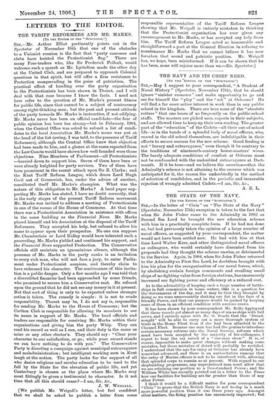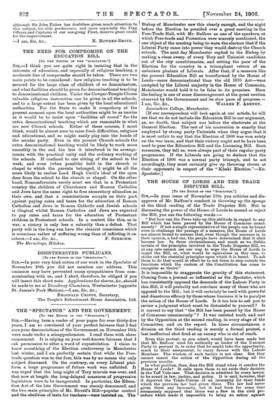THE STATE OF THE NAVY. Pro THE EDITOR OP THE
"SPECTATOR.") Sr,—In the letter of " Civia " on "The State of the Navy" (Spectator, November 17th) exception is taken to the fact that when Sir John Fisher came to the Admiralty in 1902 as Second Sea Lord he brought the new education scheme with bim in a practically complete form. If lie had not done so, but had previously taken the opinion of a large number of naval officers, as suggested by your correspondent, the matter would not have been settled now. He had with him at that time Lord Walter Kerr, and other distinguished naval officers as colleagues, who would certainly have dissented from his proposals had they thought the scheme unwise, or detrimental to the Service. Again, in 1904, when Sir John Fisher returned to the Admiralty as First Sea Lord, he doubtless brought with him his plan for the reorganisation of our naval forces, which, by abolishing certain foreign commands and recalling small ships of no fighting value from foreign stations, has enormously increased our fighting power and efficiency at a reduced cost.
As to the advisability of keeping such a large number of battle- ships in full commission in home waters, that is a question for the Government of the day, and it may be that they thought by doing so we were unnecessarily shaking our fist in the face of a friendly Power, and that our purpose would be gained by keeping some of them in an efficient condition with nucleus crews.
It has been shown by your correspondent Mr. Rollo Appleyard that these vessels get almost as many days at sea as ships with full crews, and I entirely agree with Mr. G. Searle that the Dread- nought' will be able to carry out a more thorough system of trials in the Home Fleet than if she had been attached to the Channel Fleet. Because one man has had the genius to introduce certain necessary reforms into the Naval Service, reforms which must have been accepted by the majority of his colleagues, I regret to hear the cry raised of a "one-man show." It is, of course, impossible to make great changes without making some mistakes, but these mistakes of detail will probably be rectified. I understand that the age for entry at Osborne has already been somewhat advanced, and there is an authoritative rumour that the entry of Marine officers is not to be interfered with, allowing that splendid corps to remain as at present. With regard to our shipbuilding programme, any unprejudiced man must allow that we are retaining our position as a two-standard Power; and Sir William White has recently pointed out in a letter to the Times how our facilities for building are far greater than those of any other Power.
I think it would be a difficult matter for your correspondent "Civis" to prove that the British Navy is not to-day in a much more powerful position than it was three years ago. Amongst other matters, the firing practice has enormously improved; but
although Sir John Fisher has doubtless given much attention to this subject, his able predecessor, and more especially the Flag Officers and Captains of our sea-going Fleet, deserve great credit for the improvement.















































 Previous page
Previous page